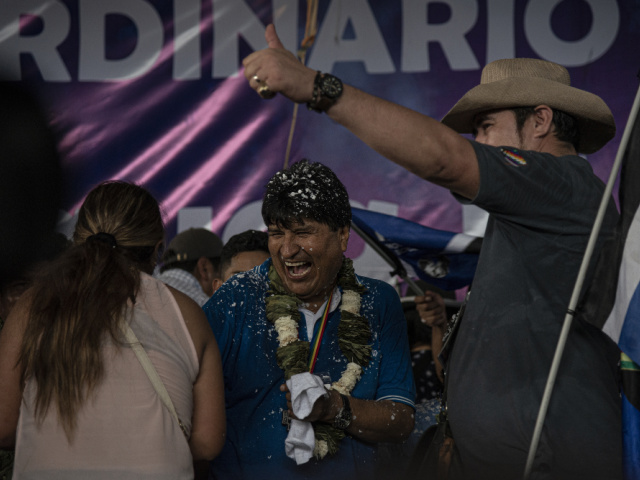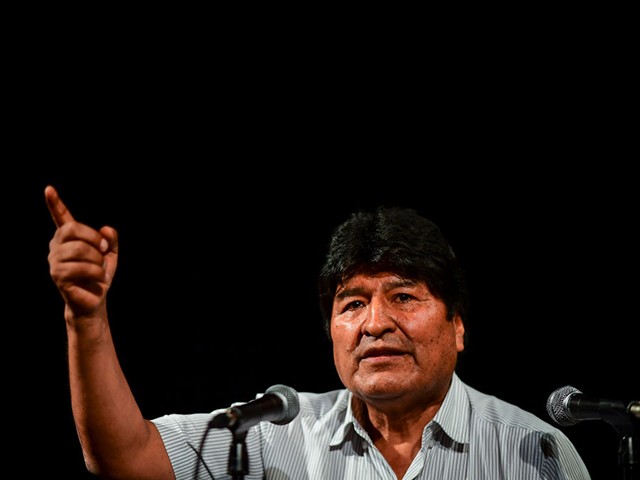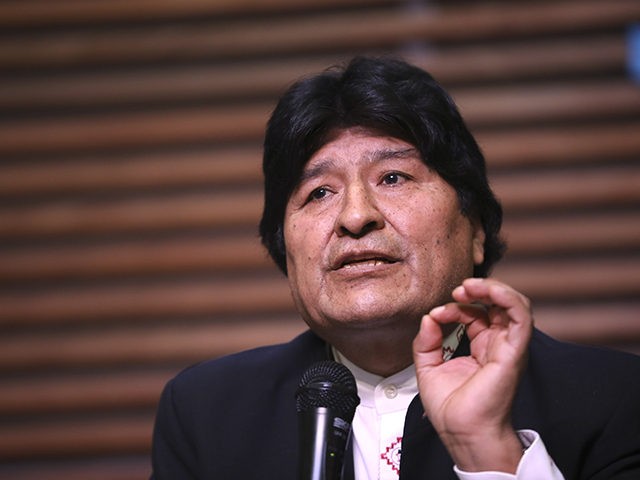Socialist former President Evo Morales announced on Sunday he would continue to campaign for president of Bolivia despite the nation’s Constitutional Court stating he is term-limited from running.
Morales is campaigning for an unconstitutional fifth term in power; the election is scheduled to take place in 2025.
Morales, who ruled Bolivia from 2006 until his voluntary resignation 2019, claims that he is still eligible to run despite the Bolivian Constitutional Court (TCP) ruling on Friday that the concept of an indefinite presidential reelection “is not a human right.” The ruling overturned a prior finding from 2017, which Morales is believed to have forced the court to issue while president, that allowed Morales to run in the 2019 election unconstitutionally.
“Evo is still qualified, that is my interpretation, neither the State political commission nor the consultative opinion establishes any limitation for discontinuous reelection,” Morales claimed during his Sunday radio show Kawsachun Coca, speaking in the third person.
Morales stated that the court’s resolution was in response to an “injunction for freedom of expression” and not for the “authorization or disqualification” of a candidate.
“Evo is still qualified as a candidate for president, they will try, what else will they do, we must be attentive, but it is an intention to create confusion and susceptibility,” Morales continued.
In its Friday ruling, TCP established that a person may only serve as president and vice-president of Bolivia for a maximum of two terms, whether continuous or discontinuous, and that indefinite reelection is not a human right.

Evo Morales, Bolivia’s former president, on stage during a campaign launch in Lauca N, Cochabamba department, Bolivia, on Wednesday, Oct. 4, 2023. ( Marcelo Perez del Carpio/Bloomberg)
“The restriction to the possibility of indefinite repostulation is a suitable measure to ensure that a person does not perpetuate himself in power,” the court’s ruling reportedly read. The full ruling has not yet been published on the Bolivian Constitutional Court’s website at press time.
The ruling immediately shuts down Morales’ plans to run for president again in 2025 and occurs in the sidelines of a growing schism inside the ruling Movement Towards Socialism (MAS) party between Morales and current socialist President Luis Arce.
Morales condemned the ruling, denouncing it as a “black plan” carried out by Arce’s government to “eliminate” him and his party “politically and even physically.”
Article 168 of Bolivia’s constitution establishes a five-year duration for a presidential term, stating that a president and vice president may only be reelected for one continuous term.
Morales ruled Bolivia between 2006 and 2019 for four terms. Morales was able to bypass the nation’s presidential term limits through the courts.
Bolivia’s socialist President Luis Arce signed contracts with China and Russia to hand over control of its two largest lithium deposits. https://t.co/g39BD9AmHT
— Breitbart News (@BreitbartNews) July 1, 2023
The courts ruled that his first term, from 2006 to 2009, did not count towards term limits because Bolivia was “refounded” as a “plurinational state” at this time, instituting a new constitution. The legal move was similar to jurisprudence issued in Venezuela in favor of late socialist dictator Hugo Chávez.
During his “second” term, Morales called for a referendum in 2016 to amend the constitution by removing presidential term limits. Bolivian people voted against the measure and the referendum failed. Morales then forced the nation’s courts in 2017 to allow him to run again a fourth time under the premise that presidential term limits represented a “violation” of his human rights.
Morales, after being allowed to run again, held a fraudulent election in October 2019, leading to international condemnation, protests, and his voluntary resignation one month later. Morales fled to Mexico alongside his cabinet of ministers.
Jeanine Áñez, a conservative senator and at the time the second vice-president of the Bolivian Chamber of Senators, was sworn in as president as she was the highest-ranking person left in the line of succession who had not fled to Mexico.
Áñez chose not to be on the ballot in the 2020 election, which resulted in MAS’s return to power and the election of socialist Luis Arce, who is currently Bolivia’s current president.

Bolivia’s ex-President Evo Morales gestures during a press conference in Buenos Aires, on December 19, 2019. (RONALDO SCHEMIDT/AFP via Getty Images)
The Bolivian government would go on to arrest Áñez in 2022 and sentence her to ten years in prison for having assumed the presidency. Áñez, the right-wing governor of Santa Cruz Luis Fernando Camacho, and six other conservatives stand accused of “plotting to depose” Morales, potentially facing 20-year prison sentences if found guilty.
Bolivia is not the only case in the region of a president bypassing constitutional term limits through court cases. In El Salvador, President Nayib Bukele will present himself for reelection in February despite the Salvadoran constitution explicitly prohibiting reelection — heavily penalizing “those who commit acts, proclamations or adhesions to promote or support the reelection or continuation of the President of the Republic, or use direct means to that end” with the complete loss of citizen rights.
Bukele is able to run for reelection next month thanks to a ruling issued by the Salvadoran courts in 2021, in which the justices — who were appointed by the pro-Bukele majority in Congress prior to the ruling — argued that a person may not run for president if they have “held the office of President of the Republic for more than six months, consecutive or not, during the immediately preceding period, or within the last six months prior to the beginning of the months prior to the beginning of the presidential term.”
Bukele, who stepped down on December 1 in order to comply with the ruling’s provisions, is slated to win in a landslide.
Christian K. Caruzo is a Venezuelan writer and documents life under socialism. You can follow him on Twitter here.

COMMENTS
Please let us know if you're having issues with commenting.